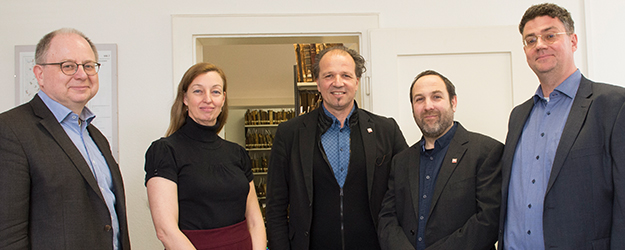25 June 2019
Twelve renowned European institutions are participating in the EU project "Research Infrastructure on Religious Studies" (ReIReS). Its aim is to promote and network the exchange of religious knowledge and research. Johannes Gutenberg University Mainz (JGU) is part of the cooperation. Talmud expert Leor Jacobi from Israel will use his chance as a ReIReS scholarship holder to investigate the Yom Kippur ritual of the medieval Jewish community in Mainz.
He first visited Mainz University about two years ago. "Back then, I gave a presentation at a conference on the Hebrew practice of bookbinding in medieval Catalonia," says Leor Jacobi. He remembers the subsequent discussion with experts from Italy, France, and Spain. Now he is back in Mainz to do research in a completely different field: The religious studies scholar from Jerusalem would like to learn more about the Yom Kippur practices in Magenza, as the city of Mainz was called in medieval Hebrew.
"At the moment, we don't know anything in this connection. There are no relevant publications," explains Jacobi. Yom Kippur, the Day of Atonement, is the holiest day of the year in the Jewish calendar. It is a strict day of fasting and a considerable number of prayer services take place. "The Ashkenazi liturgical texts produced in Germany are all very similar in essence, but some parts can vary considerably. Textual order can also be different. It can happen that rabbis compose whole passages anew. One aspect of my research will take the form of a comparison of the various surviving liturgies."
Access to libraries and archives
Jacobi is the first scholarship holder to come to Mainz under the aegis of the EU program "Research Infrastructure on Religious Studies" (ReIReS). ReIReS was launched only in February 2018 and will be funded for three years through Horizon 2020, the EU Framework Program for Research and Innovation. Twelve European institutions are participating, including the John XXIII Foundation for Religious Studies, the University of Warsaw in Poland, KU Leuven in Belgium and, of course, Johannes Gutenberg University Mainz. Professor Claus Arnold of the JGU Faculty of Catholic Theology is in charge of the Mainz subproject and is assisted by Alexandra Nusser, who coordinates all activities in the field.
ReIReS provides an innovative infrastructure for religious research, a new network to promote international exchange. Amongst other things, the two-week scholarships give young researchers access to important European libraries and archives. In Mainz, the Martinus Library, the Wissenschaftliche Stadtbibliothek (Municipal Academic Library), the Institute of Mainz Church History as well as JGU's Hymnbook Archive and the JGU Departmental Library for Theology including the Jewish Library are all opening their doors to the scholars.
As soon as he arrived, Jacobi visited the Jewish Library at Mainz University and met with his host, Professor Andreas Lehnardt of the JGU Faculty of Protestant Theology. "There are only a few Jewish community libraries in Germany like this one here that survived the Second World War," explains the Professor of Judaic Studies. The collection comprising about 5,000 volumes is still owned by the Jewish Community of Mainz, but has been given in trust to JGU.
From Jerusalem via Cairo to Mainz
"We are constantly discovering new things," points out Lehnardt. He shows the guest from Israel a letter dating to the 18th century that was only found recently folded in a book. "The document concerns the Jewish funeral society for women, explaining who can become a member and who has to pay for what." Turning to Jacobi, Lehnardt says: "I hope you can help me identify one or two other finds."
The official welcoming for Leor Jacobi from the Israeli Bar-Ilan University is also held in the Jewish Library. And the welcome is a warm one: Professor Stephan Jolie, JGU Vice President for Learning and Teaching, quickly discovers shared interests. A German philologist by training, he has worked extensively on medieval literature and can particularly recommend the Mainz Municipal Academic Library as a resource for Jacobi's research. "It contains a rich collection of medieval manuscripts. It is actually one of the ten largest assemblages of such works in Germany."
And to all of this Jacobi has access. He knows that Mainz has a long Jewish tradition and that leading Hebrew scholars worked here as rabbis. In the early Middle Ages, Jewish culture and religion flourished in the associated Hebrew communities in Mainz, Speyer and Worms, and they exerted an influence on the whole Ashkenazi world. The three are now collectively known as the "ShuM" cities, with "ShuM" being an acronym formed from the initials of the Hebrew names of the cities – Schpira (Speyer), Warmaisa (Worms; with the "W" changed into a "U"), and Magenza. A document from this period has been preserved among the Cairo Geniza manuscript collection. "It is a hand-written text of liturgical poems that were also used in the Mainz ritual. These are the only existing versions of these poems." It was exactly these that gave Jacobi the idea of coming to Mainz.
The pivotal role of religions
Jacobi's visit will be just the beginning. In the future, ReIReS scholarship holders will regularly visit the city, with its impressive libraries and archives. "At the moment we are reviewing applications for the second round," says JGU project coordinator Alexandra Nusser. In addition, the team at Mainz already organized a special training program: "Fourteen young researchers from across Europe were invited over to get to know our libraries." Furthermore, a digital network will be set up to bring together the extensive data of all twelve ReIReS partner institutions and make it accessible in several languages.
The focus of the EU project is not only Christian denominations and Judaism. "We are also interested in the great collections of Islam", adds Arnold. All three religions have played a crucial role in European history. "Through ReIReS, we will explore their historical and cultural influences on Europe and contribute to our understanding of today's multi-religious society," concludes the theologian.



